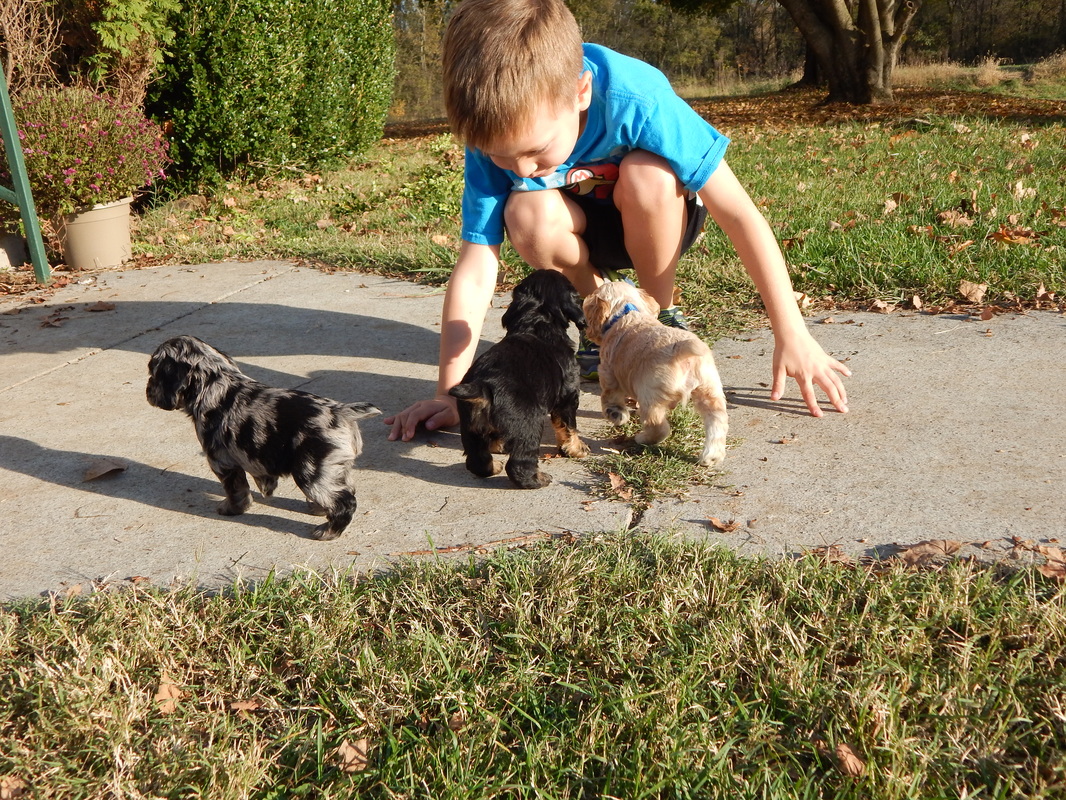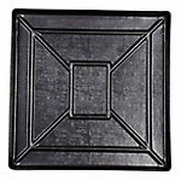The big day!
|
I know these 8 weeks have dragged by for you, but it's always a bittersweet day for our family. It's so exciting meeting you in person and seeing how much you love your new addition! We will miss them so much, but it sure makes it easier seeing how much they will be adored! The big day is so exciting and a bit overwhelming! I don't want you to feel unprepared so I hope this page helps and answers any questions you might have. If not, I'm just an email away [email protected] |
Visit our Stuff we love page to see products and links we use!
Supplies
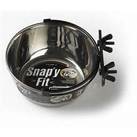
This is just a list of Must Haves to get you started. It's a good idea to start collecting these items before your puppy arrives. Of course you'll add to this list with grooming supplies and treats and probably more toys!
Stainless steel food and water bowls. I love these bowls because they clip to the side of the crate and the dogs can't dump them! If you choose to feed outside the crate any non slip stainless steel bowl will work great. Stainless steel bowls are easy to clean, and don't cause nose discoloration like plastic bowls can. 
Collar, tag and a leash
We send our puppies home with their first lupine collar and leash! A well made collar, leash and tag is a must to keep your puppy safe. Puppies grow so fast so I recommend an adjustable one for the perfect fit. We love Lupine products and all my dogs wear one! They come in a variety of colors and have a lifetime guarantee! If you are interested I can order one for you at a much better price. I order my tags from pettags4less They take about a week to arrive so order when you pick your name! It's a good idea to attach them to the collar with an S hook. 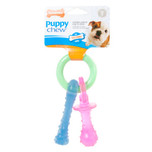
Toys, Toys and MORE TOYS!!
Go crazy in the toy department at your local pet store! Buy a variety of toys with different textures that your puppy may like to chew on. If you are looking for a bone we recommend avoiding rawhide and choosing pork skin or other natural bones. Nothing too hard or they can break their teeth. 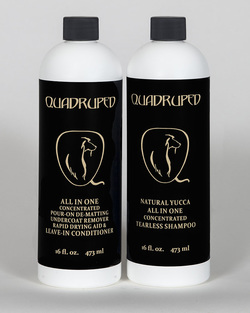
Bathing
I love the Quadruped line of Shampoos and Conditioners. Coats look beautiful and they smell so nice! Both should be diluted so a bottle lasts a long time! Click HERE if you are interested. |
Premium pet food to get your new puppy off to a good start. Your puppy will come home with a small bag to last the first week home.
Your puppy has been fed 3 meals a day and has had access to water at all times. At this age we let them eat whatever they want in 10 minutes then we pick the food up. Cut off all eating and drinking after six o’clock to make sure your puppy doesn't need to go out after bedtime. 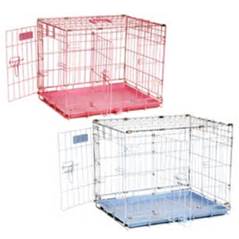
Crate, play yard or gate
These are great for housebreaking and giving your puppy a safe place to sleep. They need enough space to stand up, turn around and lay comfortably, but not enough space to potty in. We like these two crate sizes. 24"L x 18"W x 19"H or 36"L x 23"W x 25"H 
Ear Care
I have to give credit to this ear cleaner for keeping my dogs ears clean and free from infections. Diet and grooming play a big part too! I have not found it in local stores but you can order HERE |
Litter box training
It is extremely important for us to raise our puppies in a clean environment. They are raised in my living room right next to the couch! A few years ago I stumbled upon a collie breeder using litter boxes for their puppies. My first thought was this is too good to be true, but I ran out and bought the supplies the same day and I'm so glad I did! Gone are those days of mopping 24/7 and picking up destroyed puppy pads! When you cover your floor with puppy pads they have no choice but to use a pad, but some also learn to potty anywhere a pad was. When the pads are gone and you make the switch to going outside, the puppy often searches out rugs, clothing or anything left laying around. A litter box can't be mistaken for a towel left on the floor so making the switch is a lot easier.
We start training at 3.5 to 4 weeks. At that time the puppies start moving away from their bed to potty. They catch on really fast! Here what we use. Both can be found at any Tractor Supply. We have tired the litter made for dogs, but the smell is rather strong and when given a choice they prefer the pine pellets.
We start training at 3.5 to 4 weeks. At that time the puppies start moving away from their bed to potty. They catch on really fast! Here what we use. Both can be found at any Tractor Supply. We have tired the litter made for dogs, but the smell is rather strong and when given a choice they prefer the pine pellets.
Home safety
Preparing for a puppy is a lot like bringing a crawling baby into your home! Never let a new puppy have free run of the home. You are just asking them to have an accident or get into trouble.
To make your home safe for your new puppy, eliminate potential hazards around the house and pay attention to the following items:
**Keep breakable objects out of reach.
**Pick up socks, tiny objects and anything else you value off the floor.
**Empty small trash cans
**Deny access to electrical cords by hiding or covering them; make outlets safe with plastic outlet plugs.
**Safely store household chemicals.
**Keep household plants out of reach
**In the garage, be sure engine lubricants and other poisonous chemicals (especially antifreeze) are safely stored.
**If you own a pool or hot tub, check the cover or the surrounding fence to be sure they're in good condition.
**If you a have a cat, keep the litterbox and catfood away from the puppy. A baby gate usually works wonders for this!
I do not recommend allowing a new puppy in your yard alone. You can make sure they potty, stay out of trouble and feel safe by going with them. Make sure your fence is in good shape and there are no tiny places a puppy could squeeze out. Make sure they can't get stuck under a deck or shed and if you don't have a fence only go out on a leash. Accidents can happen in an instant.
To make your home safe for your new puppy, eliminate potential hazards around the house and pay attention to the following items:
**Keep breakable objects out of reach.
**Pick up socks, tiny objects and anything else you value off the floor.
**Empty small trash cans
**Deny access to electrical cords by hiding or covering them; make outlets safe with plastic outlet plugs.
**Safely store household chemicals.
**Keep household plants out of reach
**In the garage, be sure engine lubricants and other poisonous chemicals (especially antifreeze) are safely stored.
**If you own a pool or hot tub, check the cover or the surrounding fence to be sure they're in good condition.
**If you a have a cat, keep the litterbox and catfood away from the puppy. A baby gate usually works wonders for this!
I do not recommend allowing a new puppy in your yard alone. You can make sure they potty, stay out of trouble and feel safe by going with them. Make sure your fence is in good shape and there are no tiny places a puppy could squeeze out. Make sure they can't get stuck under a deck or shed and if you don't have a fence only go out on a leash. Accidents can happen in an instant.
Heading Home
We are blessed that many families drive a long time to our home or to meet us, here are some tips for the car ride home.
Keep the car ride quiet and relaxed. If your puppy whines or cries, don't punish or be overly affectionate. The later will only reinforce the behavior. Pet them softly and let the situation diffuse itself. If your puppy gets too noisy or unruly, set pup in the floor at your feet. This area is den-like and the vibrations from the road may soothe him/her. A new toy can keep them busy too. If they continue to wiggle or whine, they probably have to potty. I'll send a puppy pad home with you in case you must stop for a potty break. I've had to put these down many times in the floor of my truck or back of the SUV! If you are able to get to a safe spot in time, avoid gas stations or rest areas where you know other dogs have been walked. Remember to keep your puppy away from areas frequented by other dogs. Until he/she has been fully vaccinated, your puppy is susceptible to numerous diseases that can easily be picked up at popular dog spots.
If you have a long trip home, it's best to bring cleaner, paper towels, a few plastic bags and a pack of baby wipes to clean up the puppy. Better safe than sorry!
Keep the car ride quiet and relaxed. If your puppy whines or cries, don't punish or be overly affectionate. The later will only reinforce the behavior. Pet them softly and let the situation diffuse itself. If your puppy gets too noisy or unruly, set pup in the floor at your feet. This area is den-like and the vibrations from the road may soothe him/her. A new toy can keep them busy too. If they continue to wiggle or whine, they probably have to potty. I'll send a puppy pad home with you in case you must stop for a potty break. I've had to put these down many times in the floor of my truck or back of the SUV! If you are able to get to a safe spot in time, avoid gas stations or rest areas where you know other dogs have been walked. Remember to keep your puppy away from areas frequented by other dogs. Until he/she has been fully vaccinated, your puppy is susceptible to numerous diseases that can easily be picked up at popular dog spots.
If you have a long trip home, it's best to bring cleaner, paper towels, a few plastic bags and a pack of baby wipes to clean up the puppy. Better safe than sorry!
Home Sweet home
Once you've survived the car ride, it’s time to introduce your puppy to their new surroundings!
When you first arrive home give your puppy a chance to relieve itself in an area you have designated for that purpose. We've been using the word "potty" when we want them to go. Allow the puppy 10 minutes or so to go before bringing them in the house. Once the puppy goes give lots of praise. Make a huge deal out of it!! Once inside don't let the puppy out of sight as it explores, but give it a few minutes to look around and get use to his or her new home before playing. If your puppy gets into something they shouldn't or chews on an object that’s off-limits, don't punish. Simply exchange the object for something safe to chew on. Allow your new puppy to explore at it's own pace and try to resist overly fussing over them. Trust me I know how hard that is! If you notice that you puppy is a little anxious try not to amplify this by soothing them. Any attention for fearful behavior will only reinforce this response i.e. when I am fearful, I get attention. It is important that your puppy learns coping strategies in stressful situations.
The ideal time to bring home a new puppy is when the house is quiet. Try to keep visitors or abrupt changes in the environment to a minimum, until your puppy is settled in. You want to make your home as relaxed and stress-free as possible. Your puppy has been raised in a home with other pets and children so it will be use to lots of noise and activity, but give it time to get use to your family and routine before introducing it to a lot of people. Again I know you want to show your puppy off, but it's really important to establish a bond first! Puppies tire easily and need lots of rest. We know everyone is excited to see the cute new family member, but if they seem to be tired or timid, let them rest. After introducing your puppy to the house, it will probably be hungry. Your puppy is use to eating 3 meals a day and has had access to water at all times. When they finish eating, head to the potty area and wait for them to go. Generally, you should take your puppy outside after each meal, after he/ she wakes up from a nap, and after a long play session. A simple rule to remember is to take your puppy’s age in months and add one to get the number of hours puppy should be able to wait before going out. So a 2 month old puppy can wait around 3 hours before they have to use the bathroom. Every puppy is different though. We get tons of positive feedback that the pups are sleeping through the night right away! Use the same potty area each time and be patient. If he/she doesn't go, bring pup back inside. If they go, then offer lots of praise! These are the beginning stages of house training.
Our puppies leave our home 100% litterbox trained. It's the same idea of puppy pads, but we use a 24x24 tray and equine pine pellets. It's so important to raise them in a clean environment and this has worked amazingly well for us! From 6 to 8 weeks we start taking the puppies outside to potty throughout the day. They have no issues going on grass! If you have any questions about litter training, please let me know. Many families choose to continue with a litter box during the first few months, but again they have no problem going outside to potty.
When you first arrive home give your puppy a chance to relieve itself in an area you have designated for that purpose. We've been using the word "potty" when we want them to go. Allow the puppy 10 minutes or so to go before bringing them in the house. Once the puppy goes give lots of praise. Make a huge deal out of it!! Once inside don't let the puppy out of sight as it explores, but give it a few minutes to look around and get use to his or her new home before playing. If your puppy gets into something they shouldn't or chews on an object that’s off-limits, don't punish. Simply exchange the object for something safe to chew on. Allow your new puppy to explore at it's own pace and try to resist overly fussing over them. Trust me I know how hard that is! If you notice that you puppy is a little anxious try not to amplify this by soothing them. Any attention for fearful behavior will only reinforce this response i.e. when I am fearful, I get attention. It is important that your puppy learns coping strategies in stressful situations.
The ideal time to bring home a new puppy is when the house is quiet. Try to keep visitors or abrupt changes in the environment to a minimum, until your puppy is settled in. You want to make your home as relaxed and stress-free as possible. Your puppy has been raised in a home with other pets and children so it will be use to lots of noise and activity, but give it time to get use to your family and routine before introducing it to a lot of people. Again I know you want to show your puppy off, but it's really important to establish a bond first! Puppies tire easily and need lots of rest. We know everyone is excited to see the cute new family member, but if they seem to be tired or timid, let them rest. After introducing your puppy to the house, it will probably be hungry. Your puppy is use to eating 3 meals a day and has had access to water at all times. When they finish eating, head to the potty area and wait for them to go. Generally, you should take your puppy outside after each meal, after he/ she wakes up from a nap, and after a long play session. A simple rule to remember is to take your puppy’s age in months and add one to get the number of hours puppy should be able to wait before going out. So a 2 month old puppy can wait around 3 hours before they have to use the bathroom. Every puppy is different though. We get tons of positive feedback that the pups are sleeping through the night right away! Use the same potty area each time and be patient. If he/she doesn't go, bring pup back inside. If they go, then offer lots of praise! These are the beginning stages of house training.
Our puppies leave our home 100% litterbox trained. It's the same idea of puppy pads, but we use a 24x24 tray and equine pine pellets. It's so important to raise them in a clean environment and this has worked amazingly well for us! From 6 to 8 weeks we start taking the puppies outside to potty throughout the day. They have no issues going on grass! If you have any questions about litter training, please let me know. Many families choose to continue with a litter box during the first few months, but again they have no problem going outside to potty.
The First Night
This always seems to be the scariest part for most families, but our puppies usually do pretty well!
Remember that this has been a big day for your puppy. Everything is new and everything has changed. It’s the first time your puppy has spent the night away from their litter mates.
With a little preparation and patience, you can make the most of the first night with your puppy. We send our babies home with a "stinky toy" It 's been well loved and helps them adjust. Let them sleep with it the first few nights, then you can throw it in the wash!
***Take up any food or water after six or seven o’clock to make sure your puppy is running on empty when it’s time to sleep. Otherwise, you’ll be making trips to the bathroom all night, or worse, your puppy will eliminate in the house or crate.
***Shortly before you go to bed, spend some time playing with your puppy. You want them to be tired enough to sleep soundly. Definitely don’t let him nap within an hour or two of bedtime or else your puppy will be ready to play when you’re ready to sleep.
***Just before bed, take your puppy outside to the potty area and wait for him or her to go. When they do praise your new puppy and bring them back inside. This reinforces good behavior and begins the house training process.
If possible, you should let your puppy sleep in your bedroom to reduce the chances of whining or crying at night. As a last resort, you can keep your new puppy somewhere other than your bedroom. We have began crate training but the door has been open so the puppy can potty if they need to. If you plan on locking the crate you should check on the puppy during the night for a potty break.
If and when your puppy starts crying at night, you need to decide if he has to go to the bathroom or if he’s looking for attention. If he’s been quiet for a few hours and suddenly starts to cry or whine, he may need to go out. Puppies have small bladders, so you'll likely have to take him out at least once during the night.
If your puppy is crying and you're sure it doesn't need to potty, reach down and soothe him a little. Don't be too doting or coddle your puppy. This will only reinforce the behavior and they will cry even more. If he continues to whine, a gruff “Quiet” should settle the matter. If all else fails, ignore him. Tough love may be difficult, but eventually your puppy will learn that crying at night gets him nowhere. The more persistent you are in your approach, the quicker the situation will be resolved. If you’re stern one minute and sympathetic the next, your puppy will only be confused and his behavior will continue.
In the morning get up right away and take your puppy outside to his potty area. Carry him. Don’t let him walk there or he may be tempted to go before he gets outside. Let him empty everything out, and praise him when he’s finished.
As with any new baby, you may not get much sleep the first few night with puppy. If you’re patient and understanding, your puppy will learn what you expect of him when it’s time to sleep. You both should wake up rested and ready for the day after a few nights together.
If you have any questions please let me know! I'm here for you and will help to the best of my ability! We offer LIFETIME breeder support! Please keep in touch! We love seeing our babies grow and our Facebook page is a great way to connect and share updates!
Thank you for choosing one of our babies and Welcome to the Mud River Cocker Family!
Remember that this has been a big day for your puppy. Everything is new and everything has changed. It’s the first time your puppy has spent the night away from their litter mates.
With a little preparation and patience, you can make the most of the first night with your puppy. We send our babies home with a "stinky toy" It 's been well loved and helps them adjust. Let them sleep with it the first few nights, then you can throw it in the wash!
***Take up any food or water after six or seven o’clock to make sure your puppy is running on empty when it’s time to sleep. Otherwise, you’ll be making trips to the bathroom all night, or worse, your puppy will eliminate in the house or crate.
***Shortly before you go to bed, spend some time playing with your puppy. You want them to be tired enough to sleep soundly. Definitely don’t let him nap within an hour or two of bedtime or else your puppy will be ready to play when you’re ready to sleep.
***Just before bed, take your puppy outside to the potty area and wait for him or her to go. When they do praise your new puppy and bring them back inside. This reinforces good behavior and begins the house training process.
If possible, you should let your puppy sleep in your bedroom to reduce the chances of whining or crying at night. As a last resort, you can keep your new puppy somewhere other than your bedroom. We have began crate training but the door has been open so the puppy can potty if they need to. If you plan on locking the crate you should check on the puppy during the night for a potty break.
If and when your puppy starts crying at night, you need to decide if he has to go to the bathroom or if he’s looking for attention. If he’s been quiet for a few hours and suddenly starts to cry or whine, he may need to go out. Puppies have small bladders, so you'll likely have to take him out at least once during the night.
If your puppy is crying and you're sure it doesn't need to potty, reach down and soothe him a little. Don't be too doting or coddle your puppy. This will only reinforce the behavior and they will cry even more. If he continues to whine, a gruff “Quiet” should settle the matter. If all else fails, ignore him. Tough love may be difficult, but eventually your puppy will learn that crying at night gets him nowhere. The more persistent you are in your approach, the quicker the situation will be resolved. If you’re stern one minute and sympathetic the next, your puppy will only be confused and his behavior will continue.
In the morning get up right away and take your puppy outside to his potty area. Carry him. Don’t let him walk there or he may be tempted to go before he gets outside. Let him empty everything out, and praise him when he’s finished.
As with any new baby, you may not get much sleep the first few night with puppy. If you’re patient and understanding, your puppy will learn what you expect of him when it’s time to sleep. You both should wake up rested and ready for the day after a few nights together.
If you have any questions please let me know! I'm here for you and will help to the best of my ability! We offer LIFETIME breeder support! Please keep in touch! We love seeing our babies grow and our Facebook page is a great way to connect and share updates!
Thank you for choosing one of our babies and Welcome to the Mud River Cocker Family!

